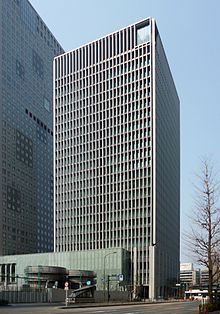|
Japan Business Federation
The Japan Business Federation (日本経済団体連合会, Nippon Keizai-dantai Rengōkai) is an economic organization founded in May 2002 by amalgamation of Keidanren (経済団体連合会, Japan Federation of Economic Organizations, established 1946; name sometimes used alone as abbreviation for whole organization) and Nikkeiren (日本経営者団体連盟, Japan Federation of Employers' Associations, established 1948), with Nikkeiren being absorbed into Keidanren.[1][2] The federation is commonly referred to as "Keidanren", its 1,601 members consist of 1,281 companies, 129 industrial associations, and 47 regional economic organizations (as of June 15, 2010).[3] For most of the post-war period, Keidanren has been the voice of big business in Japan and is generally considered the most conservative of the country's three major private sector led business associations. The other two organizations are the Japan Chamber of Commerce and Industry (日本商工会議所) and the Japan Association of Corporate Executives (経済同友会). According to the organization's official website, the mission of the Keidanren is to: accelerate growth of Japan's and the world's economy, and to strengthen the corporations to create additional value to transform the Japanese economy into one that is sustainable and driven by the private sector by encouraging the ideas of individuals and local communities. The current chairman is Masakazu Tokura of Sumitomo Chemical. He has been chairman of The Japan Business Federation since June 2021. ViewsView on consumption taxKeidanren supported the Noda government's efforts to raise Japan's consumption tax from 5% to 10%. It had previously called for the consumption tax to be raised even higher, to 15%.[4] Views on nuclear powerAfter the March 11 nuclear disaster and subsequent shutdown of all the nuclear plants in Japan, Keidanren called for their restart.[5] This view was not shared by all business leaders, with Rakuten president Hiroshi Mikitani leaving the federation partly over this issue. Masayoshi Son of Softbank publicly objected to the focus on restarting the nuclear plants, but didn't leave the federation over it.[6] Political donationsKeidanren and its predecessor bodies had a long history of providing substantial political donations to the Liberal Democratic Party. In the lead-up to the 2009 general election the Democratic Party of Japan made a pledge to ban political donations from companies and organizations. After the DPJ victory in that election, Keidanren stopped making political donations.[7][8] Changes to board compositionIn 2002, when Keidanren took on its current form, two-thirds of its 18 vice-chairmen were from manufacturing companies. As of July 2012, only 8 of the 18 are filled by executives of manufacturers.[8] Current board Below are the lists of presidents, Chair, Vice-presidents and Vice-Chairs of Japan Business Federation (as of July 1, 2021).[9]
Past officeholders
See also
References
External links
|
||||||||||||||||||||||||||||||||||||||||||||||||||||||||||||||||||||||||||||||||||||||||||||||||||||||||||||||||||||||||||||||||||||||||||||||||||||||||||||||||||||||||||||||||||||||||||||||||||||||||||||||||||||||||||||

